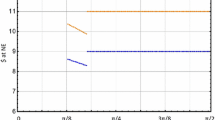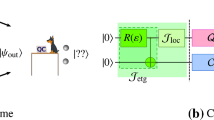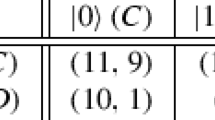Abstract
Quantum game theory is a rapidly evolving subject that extends beyond physics. In this research work, a schematic picture of quantum game theory has been provided with the help of the famous game Prisoners’ Dilemma, where both of the prisoners possess an entangled qubit. Increasing the payoffs of the prisoners, quantum theory introduces a new Nash equilibrium. It has been considered that the shared qubits may interact with the environment, which is a bath of simple harmonic oscillators. This interaction introduces decoherence. Calculating the decoherence factor, we have shown that as time increases, the new Nash equilibrium disappears and accordingly the corresponding payoffs reduce. The decoherence factor has been analyzed for different time regions, and a characteristic time scale of decoherence has also been provided. A critical time scale, below which Alice and Bob can use the quantum strategy to achieve a higher payoff, has been described with its connection to the off-diagonal elements of the reduced density matrix of the prisoners. The critical time scale has also been discussed based on whether the decoherence occurred once or twice. A comparative discussion establishes that the process of decoherence is faster when it occurs twice. It needs to be mentioned here that the total time of decoherence is the same in both cases.






Similar content being viewed by others
References
Eisert, J., Wilkens, M., Lewenstein, M.: Quantum games and quantum strategies. Phy. Rev. Lett. 83, 3077–3080 (1999)
Nash, J.: Equilibrium points in n-person games. Proc. Natl. Acad. Sci. 36, 48–49 (1950)
Nash, J.: Non-cooperative games. Ann. Math. 54, 286–295 (1951)
Leggett, A.J., et al.: Dynamics of the dissipative two-state system. Rev. Mod. Phys. 59, 1–85 (1987)
Reina, J.H., Quiroga, L., Johnson, N.F.: Decoherence of quantum registers. Phys. Rev. A 65, 032326 (2002)
Huang, Z., Qiu, D.: Quantum Games under Decoherence. Int. J. Theor. Phys. 55, 965–992 (2016)
Axelrod, R.: The Evolution of Cooperation. Basic Books (1984)
Walls, D.F., Milburn, G.J.: Quantum Optics. Springer (1994)
Breuer, H.-P., Petruccione, F.: The Theory of Open Quantum Systems. Oxford University Press (2002)
Osborne, M.J.: An Introduction to Game Theory. Oxford University Press (2004)
Acknowledgements
I would like to thank Dr. Sankhasubhra Nag, Department of Physics, Ramakrishna Mission Vivekananda Centenary College, Rahara, Kolkata-118, for many fruitful discussions and suggestions on Quantum Decoherence.
I am grateful to Dr. Parthasarathi Joarder, Department of Physics, Sister Nivedita University, New Town, Kolkata-156, for continuous worthwhile academic discussions.
Author information
Authors and Affiliations
Corresponding author
Ethics declarations
Declaration
Before joining the present affiliation, financial support was received from C.S.I.R., Government of India (Award Letter No. 09/015(0496)/2016-EMR-I), when the author was affiliated to Bose Institute, Kolkata, India.
Additional information
Publisher's Note
Springer Nature remains neutral with regard to jurisdictional claims in published maps and institutional affiliations.
Rights and permissions
About this article
Cite this article
Naskar, K. Quantum version of Prisoners’ Dilemma under interacting environment. Quantum Inf Process 20, 365 (2021). https://doi.org/10.1007/s11128-021-03310-x
Received:
Accepted:
Published:
DOI: https://doi.org/10.1007/s11128-021-03310-x




